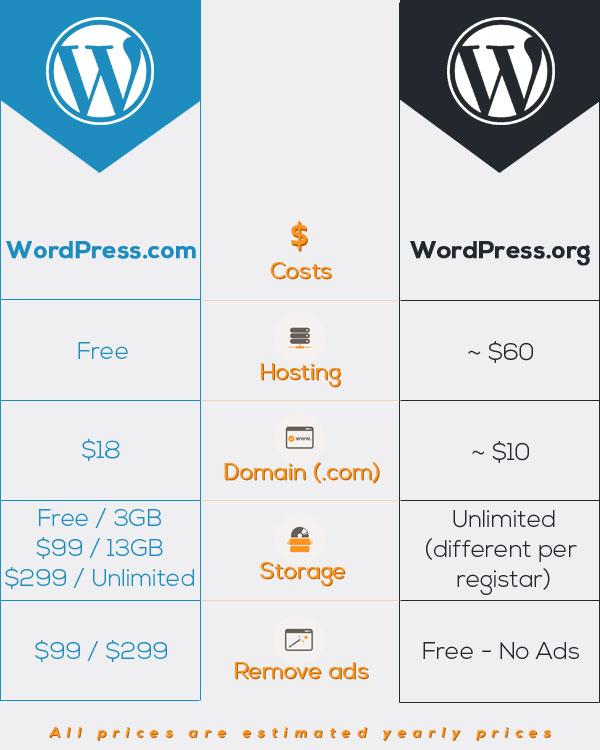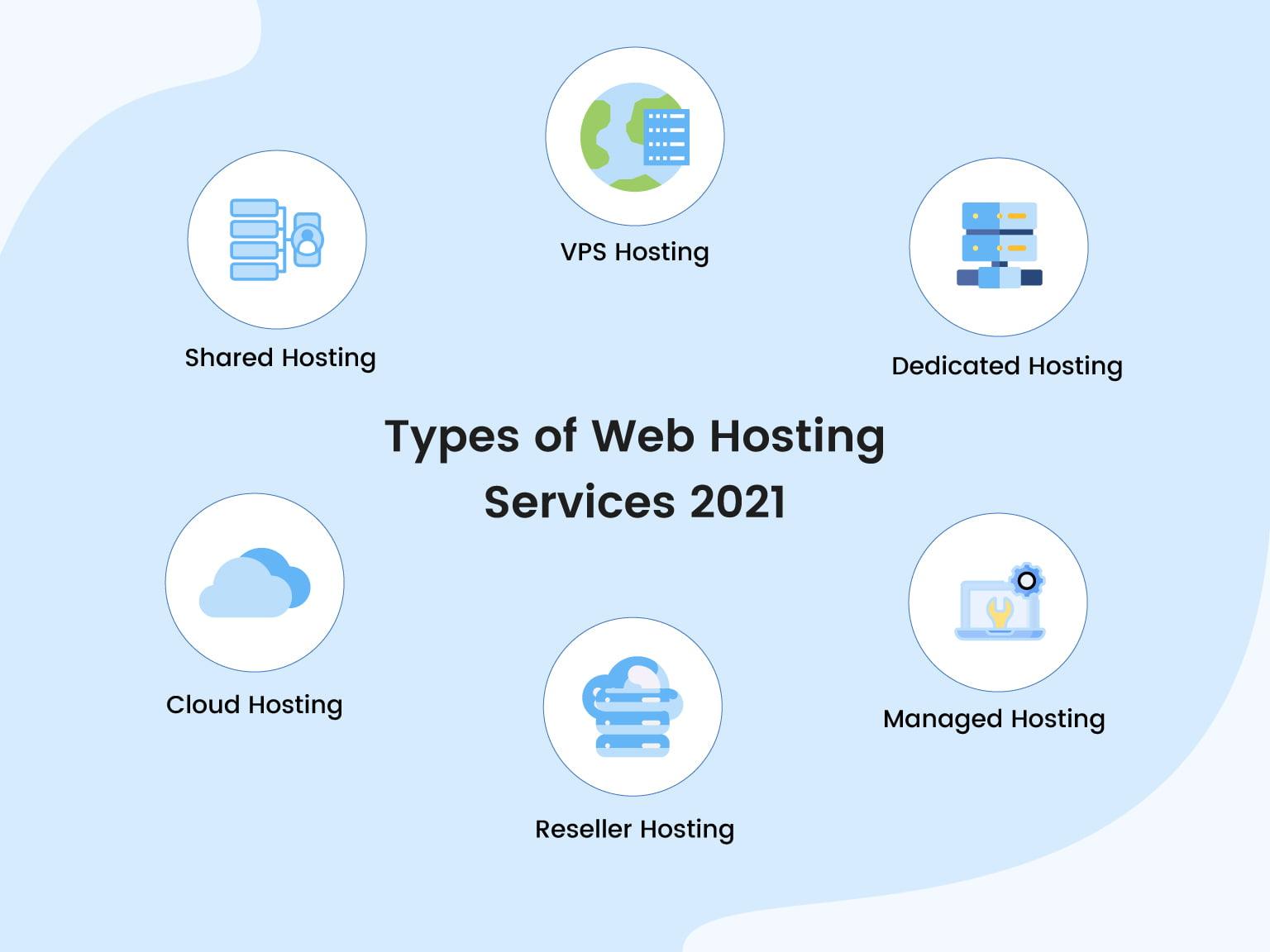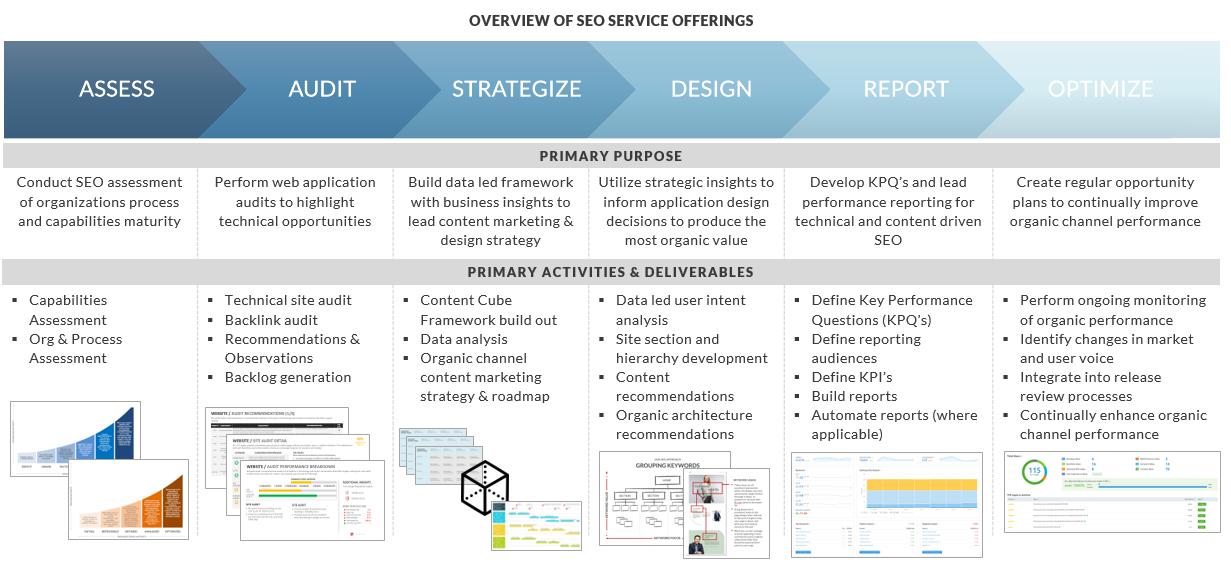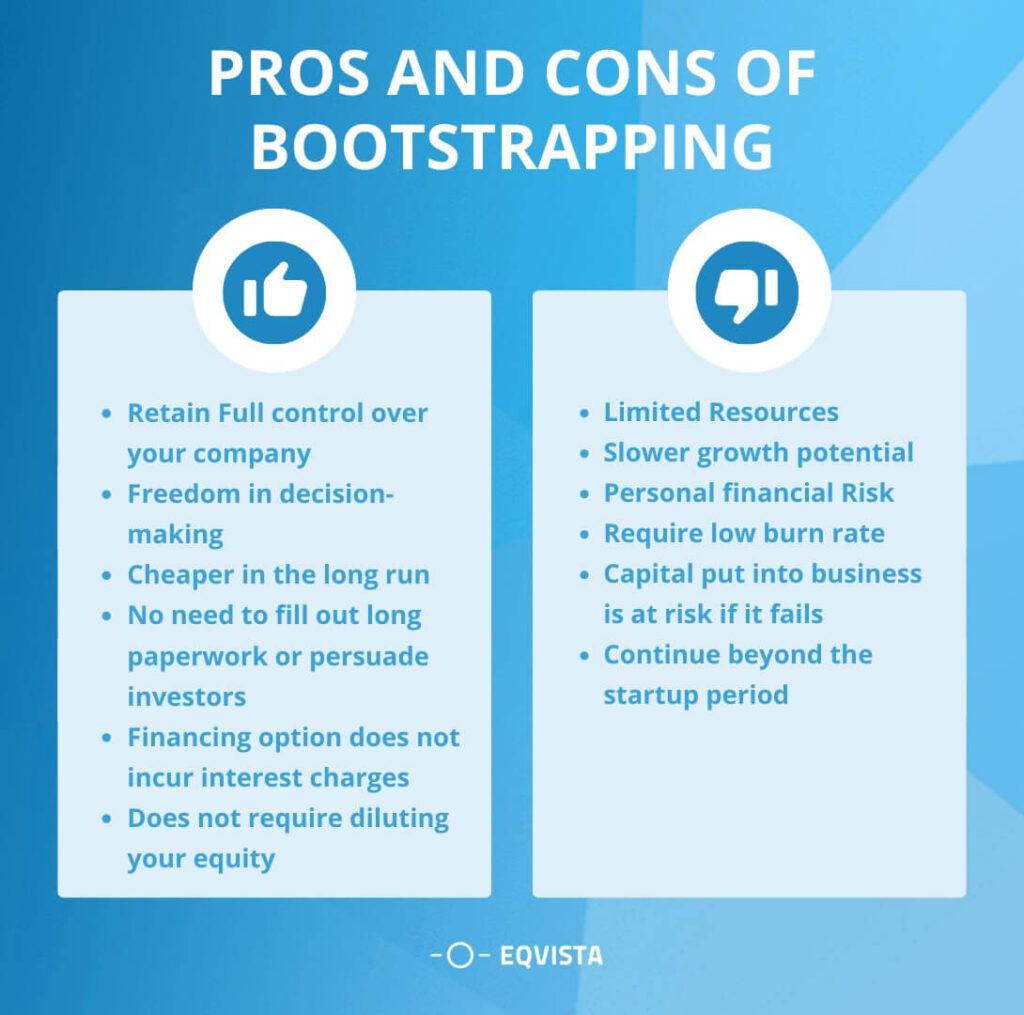
Are you thinking about starting a blog or building a website, but feeling a bit perplexed by the terms WordPress.com and WordPress.org? You’re not alone! Many aspiring website creators find themselves in a bit of a confusion when it comes to these two platforms. While they share the same name and core functionality—helping you create stunning websites—they cater to different needs and levels of expertise. In this article, we’ll break down the key differences between WordPress.com and WordPress.org in a way that’s easy to understand. Whether you’re a hobbyist looking to share your thoughts or an entrepreneur wanting to establish an online presence, knowing which platform is right for you can make all the difference. So, let’s dive in and help you choose the best option for your web journey!
Understanding the Basics of WordPress.com and WordPress.org
When diving into the world of WordPress, it’s essential to grasp the fundamental differences between WordPress.com and WordPress.org. Both platforms serve distinct purposes, and understanding these nuances can greatly influence your decision on where to build your online presence.
WordPress.com is a hosted solution that allows users to create websites without needing to manage any technical aspects. Here are some key points:
- Easy Setup: You can start building your site within minutes, with no need for hosting or domain registration.
- Maintenance-Free: All updates and security measures are handled by WordPress.com, freeing you from technical worries.
- Basic Features: While it offers a range of free themes and plugins, some advanced functionalities are limited unless you opt for a premium plan.
On the other hand, WordPress.org is the self-hosted version that gives you complete control over your website. Here’s what you should know:
- Full Customization: You can use any theme or plugin you want, allowing for a truly personalized design and functionality.
- Monetization Options: There are no restrictions on monetizing your site, letting you explore ads, e-commerce, and more.
- Ownership and Control: You own your content and data, giving you the freedom to migrate or change hosting providers anytime.
To further illustrate the differences, consider the following comparison:
| Feature | WordPress.com | WordPress.org |
|---|---|---|
| Hosting | Included | Self-hosted |
| Customization | Limited | Unlimited |
| Cost | Free with paid plans | Free (hosting costs apply) |
| Monetization | Restricted | Full control |
| Support | Community & Paid | Community-driven |
Choosing between these platforms ultimately comes down to your specific needs and goals. If you prefer a hassle-free experience and don’t mind some limitations, WordPress.com might be the right fit. Conversely, if you’re looking for flexibility and control, WordPress.org is the way to go.
Understanding these basics will empower you to make an informed decision that aligns with your vision, whether you’re starting a blog, an online shop, or a professional portfolio. Dive into the realm of possibilities that each platform offers and choose the one that resonates with your ambitions.

Exploring the Hosting Options: Which is Right for You?
When it comes to hosting options for your WordPress site, understanding the differences between WordPress.com and WordPress.org is crucial in making the right choice for your needs. Both platforms offer unique features, and selecting the correct one can significantly affect your website’s performance, flexibility, and overall experience.
WordPress.com is essentially a hosted solution. This means that the service takes care of all the server management and maintenance for you. Here are some key points to consider:
- Ease of Use: It’s beginner-friendly and requires no technical skills to get started.
- Free Plan: You can create a website at no cost, with limited features.
- Automatic Updates: WordPress.com handles all updates and backups for you.
- Built-in Security: Security protocols are managed on your behalf, which can be a relief for non-tech-savvy users.
However, this convenience comes at a cost. Customization is limited. You can’t install plugins or themes unless you’re on a paid plan, which can restrict your site’s growth and functionality. If you’re serious about building a brand or a business, this might hold you back.
On the other hand, WordPress.org gives you complete control over your website. It’s a self-hosted solution, meaning you need to find a reliable hosting provider and manage everything. Here’s what makes it appealing:
- Full Customization: You can install any plugins or themes you desire, allowing for extensive customization.
- Monetization Options: You have the freedom to run ads and choose your preferred method of monetization.
- Ownership: You have complete ownership of your content, and you’re not restricted by platform policies.
- Scalability: As your website grows, it’s easier to scale your hosting and resources accordingly.
However, with great power comes great responsibility. You’ll need to handle hosting, backups, and security yourself or invest in managed services. This can be overwhelming for beginners but is a worthy investment if you’re looking to establish a serious online presence.
| Feature | WordPress.com | WordPress.org |
|---|---|---|
| Hosting | Included | Self-hosted |
| Cost | Free (with limitations) | Varies (hosting fees applicable) |
| Customization | Limited | Unlimited |
| Monetization | Limited options | Full control |
| Maintenance | Managed | Self-managed |
Ultimately, the decision between WordPress.com and WordPress.org boils down to your specific needs, level of expertise, and long-term goals. If you’re looking for a hassle-free setup with minimal responsibility, WordPress.com might be your best bet. However, if you envision a robust website that represents your brand and allows for growth, the self-hosted WordPress.org could be the path you want to take.
Customization Freedom: How Each Platform Stacks Up
When it comes to customization, there’s a world of difference between WordPress.com and WordPress.org. Each platform offers unique capabilities, catering to different levels of user experience, goals, and technical know-how. Let’s dive into how they stack up against each other in terms of customization freedom.
WordPress.com is often seen as a beginner-friendly option, but this comes at a cost when it comes to customization. While you can choose from a variety of themes and make some basic tweaks, the platform is designed to keep things simple. Here’s what you can expect:
- Access to a selection of free and premium themes.
- Limited ability to customize themes unless on higher-tier plans.
- Restrictions on plugins and custom code.
- Basic CSS editing options available on Business and eCommerce plans.
On the other hand, WordPress.org opens up a realm of possibilities for those who crave full control over their site. This self-hosted version allows you to tailor every aspect of your website without restrictions. Here’s what you gain:
- Unlimited theme options, including thousands of free and premium themes.
- The ability to install any plugins to extend functionality.
- Full access to the site’s code, allowing for custom modifications.
- Freedom to monetize your site however you wish.
If we compare the two in a simple table, the differences become glaringly obvious:
| Feature | WordPress.com | WordPress.org |
|---|---|---|
| Themes | Limited selection | Unlimited options |
| Plugins | Restricted | Full access |
| Code Access | No | Yes |
| Monetization | Limited | Full freedom |
For those looking to create a unique brand identity or specific functionality, WordPress.org is the clear winner. With the capability to modify your site at every level, you can create an online presence that truly reflects your vision.
Yet, it’s important to weigh the pros and cons. While the flexibility of WordPress.org is enticing, it does require a certain level of technical skill and commitment to web management. Conversely, WordPress.com offers simplicity, but at the expense of personalization. Ultimately, the choice hinges on your goals and how much control you desire over your website’s aesthetic and functionality.
Cost Comparison: What You Need to Know Before You Decide
When it comes to choosing between WordPress.com and WordPress.org, understanding the financial implications is crucial. Both platforms offer unique advantages, but their cost structures can significantly influence your decision-making process. As you consider which option aligns better with your needs, it’s essential to break down the costs associated with each.
WordPress.com operates on a freemium model, which means you can start for free, but as your site grows and requires additional features, costs can escalate quickly. Here’s a brief overview of what you might expect:
- Free Plan: Basic features, limited storage, and ads.
- Personal Plan: Around $4/month, removes ads, and offers a custom domain.
- Premium Plan: About $8/month, adds advanced design customization and monetization options.
- Business Plan: Approximately $25/month, includes plugin support and advanced SEO tools.
- eCommerce Plan: Around $45/month, designed specifically for online stores with robust features.
On the other hand, WordPress.org is an open-source platform that requires you to manage your own hosting and domain. While it may appear more daunting upfront, the potential for customization and control often justifies the costs:
- Domain Name: Typically $10-$15/year.
- Web Hosting: Ranges from $3-$30/month depending on the provider and plan chosen.
- SSL Certificate: Free with many hosting providers, or around $50/year for premium options.
- Premium Themes and Plugins: Costs can vary, with some themes and plugins being free, while others may range from $30-$200 each.
To help visualize the cost differences, here’s a simple comparison table:
| Feature | WordPress.com | WordPress.org |
|---|---|---|
| Initial Cost | Free (Basic) | Domain + Hosting |
| Customization | Limited | Extensive |
| Monetization Options | Limited | Full control |
| Support | Community + Paid Support | Community + Self-Support |
Ultimately, the true cost will depend on your specific needs and goals. If you’re looking to launch a simple blog with minimal upkeep, WordPress.com could be the more economical choice. However, if you envision a fully customizable site with eCommerce capabilities or advanced features, WordPress.org might prove to be the better investment in the long run.
weighing the costs against the benefits is key. Take the time to analyze your current and future needs, and choose the platform that not only fits your budget but also supports your aspirations.

User Experience: Which Platform is More User-Friendly?
When it comes to user-friendliness, both WordPress.com and WordPress.org have their unique strengths and weaknesses. Choosing the right platform largely depends on your needs and level of expertise. For beginners or those who prefer a hassle-free experience, WordPress.com shines with its simplicity and ease of use.
On WordPress.com, you can quickly set up a blog or website without any technical knowledge. The platform offers a streamlined interface, where you can:
- Create posts and pages with a straightforward editor.
- Customize your site using pre-built themes.
- Access built-in hosting, eliminating the need for separate hosting services.
However, this simplicity comes at a cost. While WordPress.com is user-friendly, it does limit your customization options unless you opt for paid plans. On the other hand, WordPress.org provides extensive flexibility and control, but it requires a bit more technical know-how.
With WordPress.org, you have the freedom to:
- Install any theme or plugin to enhance your site’s functionality.
- Modify the code if you’re comfortable with HTML and CSS.
- Choose your hosting provider, giving you control over performance and costs.
Here’s a quick comparison of the user experience between the two platforms:
| Feature | WordPress.com | WordPress.org |
|---|---|---|
| Ease of Use | Very easy; great for beginners | Moderate; requires some technical skills |
| Customization | Limited options on free plan | Unlimited; full control |
| Hosting | Included | Self-hosted; needs setup |
| Cost | Free with options to upgrade | Hosting costs apply |
If you’re looking for a platform that allows you to focus on content without the technical hassle, WordPress.com is a solid choice. However, if you envision a more personalized and feature-rich website, WordPress.org will be the way to go, despite the learning curve.
Ultimately, the decision lies in balancing your need for simplicity against your desire for customization. Assess your goals, and choose the platform that aligns best with your vision.

Support and Community: Where to Find Help When You Need It
When navigating the world of WordPress, whether you’re opting for WordPress.com or WordPress.org, having a solid support system and community can make all the difference. If you ever find yourself feeling stuck or overwhelmed, there are plenty of resources available to help you get back on track.
WordPress Support Forums are a fantastic place to start. Here, you can pose questions, share experiences, and seek advice from fellow users who have encountered similar challenges. Simply log in to the WordPress Support Forums and dive into a diverse community eager to assist.
For those using WordPress.com, the WordPress.com Support Center offers extensive documentation and guides tailored specifically for that platform. You’ll find a wealth of information ranging from troubleshooting tips to advanced techniques for customization. Access it anytime at WordPress.com Support.
If you’re looking for more personalized assistance, consider joining a Facebook Group or a Slack Channel dedicated to WordPress users. Connecting with users in these spaces provides a unique opportunity to share insights and build relationships with like-minded individuals. Some popular groups include:
- WordPress Help - A supportive community for all levels.
- Advanced WordPress – Great for users looking to dive deeper into development.
- WordPress for Beginners – Perfect for those just starting out.
Don’t forget about YouTube! There are countless video tutorials available covering a wide range of topics related to both WordPress.com and WordPress.org. Channels like WordPress and WPBeginner offer excellent resources to visually guide you through common tasks and challenges.
| Resource | Best For |
|---|---|
| WordPress Support Forums | General Questions |
| WordPress.com Support Center | Specific to WordPress.com |
| Facebook Groups | Community Support |
| YouTube Tutorials | Visual Learning |
Lastly, consider following WordPress blogs and newsletters that focus on updates, tips, and tricks. These resources often provide valuable insights and can keep you informed of the latest trends and best practices in the WordPress ecosystem. Some recommended sources include:
With these resources at your fingertips, you’ll find that support and community are just a click away. Whether you’re troubleshooting an issue, seeking inspiration, or looking for advice on best practices, the WordPress community is here to help you thrive.
Security Features: How Each Platform Protects Your Site
When it comes to safeguarding your website, both WordPress.com and WordPress.org offer distinct security features tailored to different types of users. Understanding these features can help you choose the right platform based on your security needs.
WordPress.com provides a robust security framework built into its service. This means that all users benefit from:
- Automatic Updates: The platform automatically updates your site to the latest version, ensuring that you always have the latest security patches.
- Built-in SSL Certificate: Every WordPress.com site comes with a free SSL certificate, which encrypts data between users and the server, protecting sensitive information.
- Regular Backups: Your content is regularly backed up, allowing for quick recovery in case of data loss or a security breach.
- Activity Monitoring: The platform actively monitors for suspicious activity and takes measures to mitigate potential threats.
On the other hand, WordPress.org gives you more control over your security measures, but it also requires you to take responsibility for implementing them. Here are the essential features:
- Customizable Security Plugins: You can choose from a variety of security plugins like Wordfence or iThemes Security to bolster your website’s defenses.
- Manual Updates: You have the flexibility to update your core files, themes, and plugins whenever necessary, though this means you must stay vigilant about security patches.
- Hosting Provider Security: Many hosting providers offer additional security measures such as firewalls or malware scanning, which you should leverage.
- Full Control Over Backups: While you can set up your own backup solutions, it requires more effort and knowledge compared to WordPress.com’s automated system.
To illustrate the differences in security features between the two platforms, here’s a concise comparison:
| Feature | WordPress.com | WordPress.org |
|---|---|---|
| Updates | Automatic | Manual |
| SSL Certificate | Included | Depends on host |
| Backups | Automatic | Customizable |
| Security Plugins | Limited | Unlimited |
| Monitoring | Provided | User’s responsibility |
Ultimately, the choice between WordPress.com and WordPress.org comes down to how much control you desire over your site’s security. WordPress.com is ideal for those who prefer a hands-off approach, leaving security to the experts. In contrast, if you’re comfortable managing your own security measures and want complete control, WordPress.org is the way to go.

Monetization Opportunities: Making Money Online with WordPress
When it comes to building a website using WordPress, understanding the differences between WordPress.com and WordPress.org can significantly influence your monetization strategy. Each platform offers unique opportunities that can align with your financial goals.
WordPress.com is a hosted platform that provides a range of plans, from free to premium. While it offers a simple setup and maintenance-free experience, the monetization options are somewhat limited:
- Free accounts cannot run ads.
- Monetization options like affiliate marketing are restricted.
- Upgrading to a business plan unlocks plugins and custom themes, allowing more flexibility.
On the other hand, WordPress.org is self-hosted and gives you complete control over your website. This flexibility opens up a broader range of monetization avenues:
- Run ads using platforms like Google AdSense.
- Implement advanced e-commerce solutions with plugins such as WooCommerce.
- Utilize premium themes and plugins for enhanced functionality and aesthetics.
- Build and sell online courses or membership sites easily.
To illustrate the differences in monetization potential, consider the following comparison:
| Feature | WordPress.com | WordPress.org |
|---|---|---|
| Ad Revenue | Limited | Unlimited |
| eCommerce Capability | Basic | Advanced |
| Flexibility with Themes | Restricted | Fully Customizable |
| Affiliate Marketing | No | Yes |
if your goal is to create a business or generate significant income online, WordPress.org is the ideal choice. It allows you to customize your site to fit your brand, optimize for SEO, and implement various revenue streams. Whether you’re selling digital products, offering subscription services, or earning through advertising, the possibilities are virtually limitless.
Ultimately, the choice between these platforms will depend on your specific needs and ambition. If you’re serious about turning your website into a source of income, investing in a WordPress.org setup can pay off significantly in the long run.

SEO Capabilities: Boosting Your Visibility on the Web
When it comes to increasing your online presence, understanding the nuances of different platforms is essential. WordPress.com and WordPress.org serve distinct purposes, and selecting the right one can significantly impact your site’s SEO potential. Here’s how these platforms differ in terms of visibility and search engine optimization.
WordPress.com is a hosted solution, which means that your site will be on WordPress’s servers. This setup provides an easy entry point for beginners, but it comes with limitations:
- Limited customization: You’re restricted in terms of themes and plugins, which can hinder your ability to optimize for SEO.
- Subdomain usage: Many sites are hosted on a subdomain (e.g., yoursite.wordpress.com), which can negatively impact credibility and search rankings.
- Ads and monetization: Free plans display ads, and monetization options are limited unless you upgrade.
On the other hand, WordPress.org offers a self-hosted solution that grants you full control over your site. Here’s how this platform excels in SEO capabilities:
- Customizable themes and plugins: You can install any theme or plugin, including powerful SEO tools like Yoast SEO or All in One SEO Pack, allowing for advanced optimization.
- Domain authority: Having your own domain (e.g., www.yoursite.com) contributes positively to your site’s credibility and SEO.
- Full control over monetization: You can monetize your site without restrictions, maximizing your earning potential.
To further illustrate the differences, consider the following table:
| Feature | WordPress.com | WordPress.org |
|---|---|---|
| Hosting | Managed by WordPress | Self-hosted |
| Customization Options | Limited | Unlimited |
| Monetization | Restricted | Full control |
| SEO Plugins | No | Yes |
while WordPress.com may seem appealing for beginners, those looking to seriously enhance their online visibility should consider WordPress.org. The flexibility, control, and advanced SEO options available on the self-hosted platform can make a substantial difference in your site’s performance in search engine results.

Scaling Your Website: Which Option Grows with You?
When considering the best platform for scaling your website, it’s essential to evaluate the flexibility and features offered by both WordPress.com and WordPress.org. Each option caters to different needs, so understanding their distinctions can help you make an informed choice that aligns with your growth ambitions.
WordPress.com is an all-in-one solution that provides hosting and maintenance, making it ideal for those who want a hassle-free experience. However, as your website scales, you may find yourself limited by:
- Customization Restrictions: While WordPress.com offers a variety of themes, you can’t upload custom themes or plugins unless you upgrade to higher-tier plans.
- Monetization Limitations: Earning through ads or affiliate marketing is restricted on free and lower-tier plans, which can hinder your revenue potential.
- Storage Space: Depending on your plan, you may encounter storage limits that could impede your ability to host high-quality images and videos.
In contrast, WordPress.org offers the ultimate in scalability and control. With a self-hosted solution, you can adapt your website as necessary. Here’s how:
- Full Customization: You can install any theme or plugin, allowing you to tailor your website to fit your specific needs and branding.
- Unlimited Monetization Options: Whether you want to sell products, run ads, or offer services, the sky’s the limit with WordPress.org.
- Control Over SEO and Performance: You have complete control over your website’s SEO settings and can optimize performance with caching plugins and CDNs.
To give you a clearer picture, here’s a comparison table that highlights the key differences between the two options:
| Feature | WordPress.com | WordPress.org |
|---|---|---|
| Hosting | Included | Self-hosted |
| Customization | Limited | Unlimited |
| Monetization | Restricted | Fully Allowed |
| Maintenance | Managed | You Manage |
| Technical Knowledge Required | None | Some |
Ultimately, if your goal is to scale and adapt over time, WordPress.org emerges as the superior choice. It provides the tools necessary for growth, whether you’re aiming for a personal blog or a robust e-commerce site. Investing in a self-hosted solution can pay dividends in flexibility, control, and potential revenue.

Choosing the Right Platform for Your Goals
When it comes to selecting the perfect platform for your online presence, understanding the nuanced differences between WordPress.com and WordPress.org is crucial. Each option caters to distinct needs and goals, making your choice significant in shaping your website’s functionality and growth potential.
WordPress.com is essentially a hosted solution, perfect for beginners or those looking for a hassle-free experience. It offers:
- Easy Setup: With WordPress.com, you can quickly create a site without worrying about technical details like hosting or maintenance.
- Built-in Security: Security measures are handled for you, ensuring your site is protected without requiring you to lift a finger.
- Free Plan Available: If your needs are modest, you can start with a free plan, making it a low-risk option to explore blogging or showcasing your portfolio.
However, with these benefits come limitations. You will encounter:
- Restricted Customization: Themes and plugins are limited, hindering your ability to create a truly unique site.
- Ads on Free Plans: If you opt for a free account, expect ads displayed on your site, which might detract from your brand.
- Less Control: You don’t own your website in the same way you do with WordPress.org, which can feel restrictive as your site grows.
On the other hand, WordPress.org is a self-hosted option that empowers you with greater control and flexibility. If your goals include:
- Custom Branding: You can create a site that is uniquely yours, tailored to reflect your brand identity.
- Plugin Freedom: With thousands of plugins available, you can enhance your site’s functionality in countless ways.
- Monetization Opportunities: You can run ads, offer memberships, or sell products directly from your site without restrictions.
However, self-hosting entails a steeper learning curve and responsibility. Consider these aspects:
- Hosting Costs: You’ll need to invest in hosting, which can vary based on the provider and plan you choose.
- Maintenance Responsibilities: Regular updates, backups, and security checks are your responsibility, requiring time and technical know-how.
- Potential for Overwhelm: The myriad of options available can be daunting if you’re not tech-savvy.
To help you visualize the fundamental differences, here’s a simple comparison table:
| Feature | WordPress.com | WordPress.org |
|---|---|---|
| Hosting | Included | Self-hosted |
| Cost | Free & Paid Plans | Hosting Fees |
| Customization | Limited | Unlimited |
| Ads | Ads on Free Plan | No Ads |
| Ownership | WordPress.com owns your site | You own your site |
Ultimately, your choice hinges on your objectives. If you’re aspiring to build a personal blog or a simple site without heavy technical commitments, WordPress.com might just be your best bet. Conversely, if you envision creating a robust business site, an online store, or a portfolio with extensive customization, WordPress.org is the way to go. Choose wisely, as the right platform can significantly influence your digital journey.

Final Thoughts: Making the Best Choice for Your Needs
Choosing between WordPress.com and WordPress.org ultimately depends on your specific needs, preferences, and level of expertise. Each platform offers distinct advantages and limitations that cater to different types of users, from casual bloggers to professional developers.
If you value simplicity and ease of use, WordPress.com might be the way to go. It’s perfect for those who want to set up a website quickly without delving into the technical aspects of web hosting and software management. With WordPress.com, you can:
- Start for free with basic features.
- Enjoy automatic updates and security features.
- Benefit from a built-in community for networking and engagement.
On the other hand, if you’re looking for complete control and customization, WordPress.org is your best bet. This self-hosted option allows you to tailor your site exactly to your specifications, which is ideal for businesses or brands looking to establish a strong online presence. With WordPress.org, you can:
- Choose from thousands of themes and plugins to enhance functionality.
- Monetize your site however you like, including ads and e-commerce.
- Optimize your website’s performance with advanced SEO tools.
To help clarify the differences further, here’s a quick comparison table:
| Feature | WordPress.com | WordPress.org |
|---|---|---|
| Cost | Free & Paid Plans | Free (Hosting Requires Payment) |
| Hosting | Included | Self-hosted |
| Customization | Limited | Unlimited |
| Monetization | Restricted | Completely Free |
| Support | Community & Paid Support | Community Support |
Before making your choice, consider what aspects are most important to you. Are you looking for a platform that allows for growth and expansion? Or is a hassle-free setup more appealing? Understanding your goals will guide you in selecting the option that best aligns with your vision.
Remember, whichever platform you choose, you’re embarking on an exciting journey of creating and sharing your content with the world. Weigh the pros and cons carefully, and don’t hesitate to explore both options; many users find that starting with WordPress.com allows them to get their feet wet before transitioning to WordPress.org as their needs evolve.
Frequently Asked Questions (FAQ)
Q&A: What is the Difference Between WordPress.com and WordPress.org?
Q: What are WordPress.com and WordPress.org?
A: Great question! Essentially, both WordPress.com and WordPress.org are platforms for creating websites, but they serve different purposes. WordPress.com is a hosted service that takes care of all the technical aspects for you. On the other hand, WordPress.org is a self-hosted solution, giving you full control over your website.
Q: I’m new to website building. Which one should I choose?
A: If you’re just starting out and want a hassle-free experience, WordPress.com might be the way to go. It’s user-friendly, requires no coding skills, and you can get your site up and running quickly. However, if you’re looking for flexibility and want to grow your site in the long term, WordPress.org is the better option. It allows you to customize your site extensively.
Q: What about costs? Is one cheaper than the other?
A: This is where things can get a little tricky. WordPress.com has a free option, but it comes with limitations like ads and restricted features. The paid plans can also add up quickly if you want more functionality. WordPress.org is free to use, but you’ll need to pay for hosting and a domain name, which can be as cheap as a few dollars a month. In the long run, if you’re serious about your website, WordPress.org often offers better value.
Q: How about customization? Can I make my site look how I want on both platforms?
A: This is a big differentiator! With WordPress.com, customization options depend on your plan. The free plan gives you very limited choices, while the higher-tier plans offer more themes and some customization options. However, with WordPress.org, the sky’s the limit! You can install any theme or plugin you want, allowing you to create a truly unique site.
Q: What about updates and maintenance? Am I responsible for that?
A: On WordPress.com, you don’t have to worry about updates or maintenance; it’s all taken care of for you. However, with WordPress.org, you are responsible for updates and security. While this may sound daunting, many hosting providers offer one-click updates and excellent customer support to help you along the way.
Q: Can I monetize my website on both platforms?
A: Yes, you can, but there are significant differences. On WordPress.com, monetization options are limited unless you upgrade to a paid plan. You can run ads, but they take a cut of your earnings. With WordPress.org, you can monetize your site however you like—ads, affiliate marketing, selling products—there are no restrictions. This flexibility is a major reason many choose WordPress.org.
Q: What if I change my mind after starting on one platform?
A: Switching from WordPress.com to WordPress.org is entirely possible, but it can be a bit of a process. You may need to move your content manually or use plugins to help with migration. If you start on WordPress.org, you’ll have the freedom to scale and evolve your site without worrying about limitations.
Q: what’s your recommendation?
A: If you’re serious about building a brand, growing your business, or creating a professional portfolio, I strongly recommend going with WordPress.org. The control, customization, and monetization options make it the superior choice for long-term success. But if you’re just dipping your toes in and want something simple, then WordPress.com is a great starting point. Just know that as you grow, you might want to transition to WordPress.org for more capabilities.
Feel free to ask more questions or dive deeper into any of these topics! Happy website building!
Wrapping Up
In closing, choosing between WordPress.com and WordPress.org can feel like navigating a maze, but it ultimately boils down to what you want from your website. If you’re looking for simplicity and ease of use, WordPress.com offers a hassle-free experience that lets you focus on your content without worrying about the technical details. However, if you’re ready to take full control and customize every aspect of your site, WordPress.org is the way to go.
Remember, both options have their unique strengths, and the right choice depends on your goals. Whether you’re starting a personal blog, a business site, or an online portfolio, knowing the differences empowers you to make an informed decision that suits your needs.
So, take a moment to reflect on what you envision for your online presence. Are you excited to dive into the world of self-hosting with endless possibilities? Or do you prefer the convenience and security that comes with a managed platform? Whichever path you choose, both WordPress.com and WordPress.org can help you create something amazing. Happy blogging!






